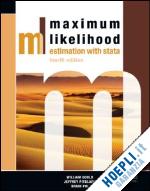THEORY AND PRACTICE The likelihood-maximization problem Likelihood theory The maximization problemMonitoring convergence INTRODUCTION TO ml The probit model Normal linear regression Robust standard errors Weighted estimation Other features of method-gf0 evaluators Limitations OVERVIEW OF ml The terminology of ml Equations in ml Likelihood-evaluator methods Tools for the ml programmer Common ml optionsMaximizing your own likelihood functions METHOD lf The linear-form restrictions Examples The importance of generating temporary variables as doubles Problems you can safely ignore Nonlinear specifications The advantages of lf in terms of execution speed The advantages of lf in terms of accuracy METHODS lf0, lf1, AND lf2 Comparing these methods Outline of evaluators of methods lf0, lf1, and lf2Summary of methods lf0, lf1, and lf2Examples METHODS d0, d1, AND d2 Comparing these methods Outline of method d0, d1, and d2 evaluators Summary of methods d0, d1, and d2Panel-data likelihoodsOther models that do not meet the linear-form restrictions DEBUGGING LIKELIHOOD EVALUATORS ml check Using the debug methods ml trace SETTING INITIAL VALUESml search ml plot ml init INTERACTIVE MAXIMIZATION The iteration log Pressing the Break key Maximizing difficult likelihood functions FINAL RESULTS Graphing convergence Redisplaying output MATA-BASED LIKELIHOOD EVALUATORSIntroductory examples Evaluator function prototypes Utilities Random-effects linear regression WRITING DO-FILES TO MAXIMIZE LIKELIHOODSThe structure of a do-file Putting the do-file into production WRITING ADO-FILES TO MAXIMIZE LIKELIHOODSWriting estimation commands The standard estimation-command outline Outline for estimation commands using ml Using ml in noninteractive mode Advice WRITING ADO-FILES FOR SURVEY DATA ANALYSIS Program properties Writing your own predict command OTHER EXAMPLES The logit model The probit model Normal linear regression The Weibull model The Cox proportional hazards model The random-effects regression model The seemingly unrelated regression model APPENDIX A: Syntax of mlAPPENDIX B: Likelihood-evaluator checklistsAPPENDIX C: Listing of estimation commands ReferencesAuthor IndexSubject Index












